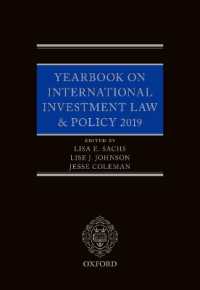- ホーム
- > 洋書
- > 英文書
- > Business / Economics
Full Description
This book examines the progression of real estate development within the deindustrialization-financialization nexus. It explores the roles it has in semi-peripheral contexts such as Romania, where it overlaps with the process of the transformation of state socialism into neoliberal capitalism, viewed at the intersection of global, national, and local forces.
The book focuses on real estate development in Romania as a product and a driver of capitalism. It contributes to ongoing debates in critical urban theories and Marxist perspectives in urban sociology. Focusing on the under-researched East European region, it decenters social research and fine-tunes the political economy theory about state and economic restructuring. The book contains methodological and theoretical insights that are useful in other contexts beyond Romania and Central and Eastern Europe, especially in other (semi)peripheral emerging markets. The focus of critical inquiry into capitalist transformations adopted in this book can also support political activism. It uncovers the varieties of the deindustrialization-financialization nexus in real estate built on the dismantled pre-1990 socialist industrial plants. The chapters describe the advancement of real estate investments across second and third-tier cities, displaying uneven development and subordinate financialization at the intersection of local and global processes and political and economic actors.
It will be of interest to researchers and students of urban sociology, economic sociology, political economy, human geography, and political geography.
Chapter 3 of this book is freely available as a downloadable Open Access PDF at http://www.taylorfrancis.com under a Creative Commons [Attribution-Non Commercial-No Derivatives (CC-BY-NC-ND)] 4.0 license.
Contents
Introduction (Enikő Vincze, Ioana Florea and Manuel B. Aalbers)
Part I. Political Economy Transformations and the Role of Real Estate Development
Chapter One. Global pension fund capitalism lands in Romania: Finance-led real estate and retail development (Manuel B. Aalbers)
Chapter Two. The winding road of privatization: a path for real estate development into former state socialist economies (Enikő Vincze and Ioana Vlad)
Chapter Three. De-risking in a context of uneven development and deindustrialized spaces: the advancement and financialization of real estate as business in Romania (Ioana Florea and Enikő Vincze)
Part II. Territorialized Synergies Between Local Public Administrations, Middle Classes, and Real Estate Actors in Second and Third-Tier Cities
Chapter Four. Putting "the fix" in the "spatial fix": restructuring class alliances and financialized real estate in the city of Bârlad (Ioana Florea, Livia Pancu and Florin Bobu)
Chapter Five. Coal-based energy urbanization and real estate development in Târgu Jiu (George Iulian Zamfir)
Chapter Six. Spatial planning at the fringes: land fragmentation and sprawling in Bragadiru (Mihail Sandu-Dumitriu)
Chapter Seven. Challenged by real estate-driven development: the urban growth machine in Cluj (Marina Mironica)
Part III. Re-making the City via Urban Governance, Regeneration, and Branding
Chapter Eight. The pressure of inter-urban competition on entrepreneurial governance aspirations: the case of Craiova (Ioana Vlad)
Chapter Nine. Urban regeneration and transnational capital investments in Reșița brownfields: from the "city of fire" to the "boutique city" (Sorin Gog)
Chapter Ten. The political economy of city rebranding: Brașov, from an industrial center to the "El Dorado" of real estate development (Enikő Vincze)
Conclusion (Enikő Vincze and Ioana Florea)








